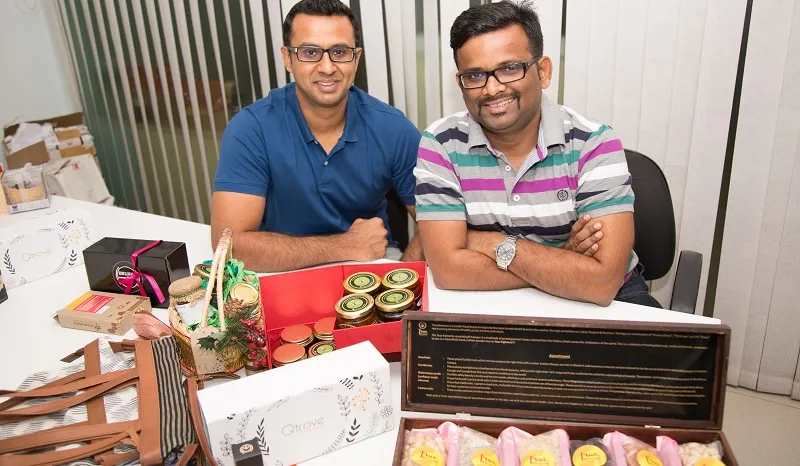The anti-Flipkart: Curated marketplace Qtrove’s discount-free, sustainability-driven billion-dollar global dreams
Profitability-focused Qtrove offers non-mass produced products from small sellers in an attempt to free online shoppers from the 'tyranny of choice'
Say you want to buy a dress. You don’t have a brand, style or colour in mind, and decide to check out Flipkart or Amazon. How do you choose from the thousands of options that these marketplaces unleash upon you? Unless you chance upon a piece of clothing you fall in love with at first sight, trying to choose will make your head spin. And when it is a utility product like a pen drive, how do you pick one over the other? The price and the brand become the only differentiators. Tyranny of choice – this sums up the experience of many e-commerce consumers.
Is this the only way to shop? No, say Vinamra Pandiya and Prashanth Nagarajan, Co-founders of barely year-old Qtrove. The Bengaluru-based startup was launched with an anti-e-commerce strategy. Says Vinamra,
We are anti-ecommerce. E-commerce is a dictatorship. There is no differentiation, only discounts. E-commerce sites buy transactions, not customers. The products are mass produced, and whichever site offers better rates gets the customer. They want the customer to come, buy and get out, and not spend time on the site. We want to build a marketplace where the products, sellers and customers are celebrated. We want our customers to stay on the site and engage with us. Our products are not mass produced - they are mostly natural and sustainable. My sellers might be small, but they make unique products. We are freeing customers from the tyranny of choice.”

A different path
That’s an impressive manifesto, and the idea did not come to Vinamra overnight. An IIT-BHU graduate, Vinamra became a foodtech entrepreneur with Mom’s Kitchen, an online startup that served food from its centralised kitchens in Pune. The company saw turnover grow to Rs 75 lakh per annum, but could not raise further funding due to the recession of 2008, and eventually shut down. Vinamra then joined food delivery startup TastyKhana in 2009 as its Chief Operating Officer, and moved to Foodpanda in 2015 when the former got acquired. However, the now well-publicised issues at Foodpanda led Vinamra to leave the company a few months later.
After almost a decade in Pune and in foodtech, Vinamra was at a crossroads. He knew he wanted to start up again, and this time, he wanted to do that in Bengaluru – India’s startup capital. He had an idea to do a curated food marketplace, and in late-2015, Vinamra got in touch with serial entrepreneur K. Ganesh of GrowthStory, a startup incubator. During his discussions with Ganesh, the original idea evolved into that of a curated marketplace for all categories. Vinamra met co-founder Prashanth, who was then managing operations for the South for Grofers, through GrowthStory.
With GrowthStory backing them, the duo met potential sellers to understand their views. The type of sellers Vinamra and Prashanth were looking for were typically small merchants and entrepreneurs making mostly unique or handcrafted products. Those who were on bigger marketplaces were unhappy as they felt lost among the large sellers. In July, the company soft-launched the site, mainly for family and friends to try out and give feedback. By November, satisfied with the feedback and with the processes in place, Qtrove began marketing and reaching out to a wider audience.
Small is big
Qtrove, which stands for curated trove, today offers about 5,000 products from 200 sellers across 40 categories. The platform is a pure marketplace, with Qtrove not holding any stock. It is, however, a closed marketplace, with the team doing background checks on sellers and quality checks of products before approving listings. “The focus is not on having a large number of products, but on curation. We have internal quality guidelines for every type of product, for example what exactly is handmade chocolate,” says Vinamra. The startup supports sellers by connecting them with logistics providers and doing all product shoots. “When Airbnb started, Craigslist was already present. The difference was the beautiful photos. To build trust, good photos that reflect the product are required. So we give a lot of importance to photographing the products,” says the 35-year-old.
The products are all non-mass produced and are mostly natural and hand crafted, and include items like sourdough breads, upcycled clothes and all-natural cosmetics. Ganesh of GrowthStory says Qtrove is mainly about discovery. He says:
It is not meant for the large manufacturers. If you are a Tirupur-based t-shirt manufacturer, your best bet is Myntra. But if you are a small player making hand painted t-shirts, then Qtrove is a better bet.”
Another decision the founders took early on was to focus on a no-discount model. About 70 percent of sales on the site happen without any discounts. “But the seller can discount if he wants, and if he wants to increase the price, he can do that too. It’s all up to him,” says Ganesh.
Small scale sellers on the site are obviously happy. Durga Menon, founder of seven-year-old Luuvia Bakery, was the first vendor to list on the site, as Prashanth was a regular customer. She makes artisanal breads from a small unit that employs 10 women. “I spend all my time in the bakery, and have no time for marketing. I am happy to be on the site as they understand food. They ensure that they get the right product descriptions from me, take appealing photographs of my breads and cakes, and enable customers to find us easily on the site,” says Durga, a former techie who returned to India after over a decade in the US. She says that while sales through the site are still only a fraction of her overall sales of Rs 3 lakh, she expects it to grow.
The right customer
While sellers are happy, what about customers, especially since online shoppers are used to being pampered with discounts? Vinamra admits that the concept will not appeal to all. “But awareness regarding the problems with mass produced products is growing. The market for the kind of products we sell is growing, and in a few years, it will be big,” says Vinamra, who claims a customer base of over 10,000, order volumes of 500 shipments a day, and an average order size of around Rs 600.
A handful of online startups offer curated or unique products in various categories, especially in furniture and home décor, like Zufolo, The Décor Kart, Bent Chai, Pinklay and Wishing Chair. Multi-category marketplaces, meanwhile, are fewer in number, with players like Jaypore, Natty and Love This Stuff in the space. While it is difficult to calculate the extent of the market for non-mass produced or handcrafted products, the market size for organic food is a good indicator. A study by industry body Assocham and non-government organisation TechSci Research estimated that the market for organic food is currently at $500 million, and will grow by three times in the next four years. Etsy, a US-based marketplace for handcrafted goods, is a listed entity with a market cap of almost $1.5 billion.
Ganesh says a company like Qtrove will be much smaller than a Flipkart or Amazon in terms of GMV. He adds:
We are not in the space of daily basic needs or even high GMV items like LED TVs. You will not come to us for that. The same customer who buys a TV on Flipkart also buys handcrafted, personalised or limited volume products for certain needs. If he wants preservative-free honey, he will come to Qtrove."
Qtrove is experimenting with its marketing to ensure that it reaches the right audience without breaking the bank. It runs Facebook and Google ads showcasing products and messaging tailored to each audience, like singles or families with kids. “I don’t want to spend crores on marketing as that would bring discount-focused customers. Our customer acquisition rate is lower, but we get the right audience,” says Vinamra.
This frugality in marketing spend is reflected in cost areas too. The company continues to have a lean team, with an employee base of 10. The idea is to throw technology at a problem and not people, and hence, they have automated functions like invoice generation and sending emailers. “I am creating systems now that can manage 10,000 orders a day,” says Vinamra, who is looking to reach 1,000 orders a day in three months. The company, which charges a commission of 25 to 30 percent from sellers, is unit positive already and is targeting operational profitability by year-end.
While growing the number of products, sellers and orders is part of the game plan, the focus is on quality, and not on growth at any cost. The idea is to increase revenue per seller, increase repeat purchase rate, and make each sale profitable. The company has also diversified into corporate and event gifting and intends to eventually go global. It has already done a few international offline bulk deals. Vinamra says:
We want to become a multi-billion dollar global entity without raising billions in capital."







